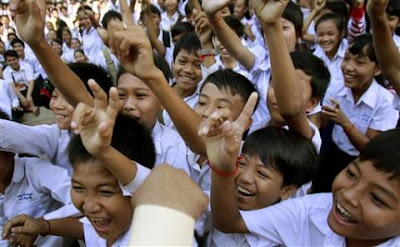 Language Corps offers several different programs for adventurous people interested in living and working in a different culture. (Photo: AP)
Language Corps offers several different programs for adventurous people interested in living and working in a different culture. (Photo: AP)Im Sothearith, VOA Khmer
Washington, DC Monday, 06 September 2010
"I didn't want to take an easy route, I wanted a real experience and I wanted to go to a place that hasn’t always had such an easy past."[Editor's note: Katherine Belida is a member of Language Corps and is traveling to Cambodia to teach English. Belida holds a Bachelor of Art in Sociology from the University of Maryland. When she was six years old, from 1993 through 2000, she lived with her family in Kenya and South Africa, where her father worked as a journalist. Belida spoke to VOA Khmer in Washington about her expectations and contributions to Cambodia.]
Why are you interested in going to Cambodia?
Well, for several reasons. I was really intrigued by Southeast Asia in general. And then as I was doing more research, I really found that the history of Cambodia, politically, was one of struggle and one of fighting that I was drawn to. I am also interested to go and see how it is changing and how it has changed in the past 20 years. And this new kind of culture is emerging. I think it is a really dynamic, interesting time to be there, and I want to be part of that.
What did you first have in mind about Cambodia?
I know it from the movie, “The Killing Fields,” which is a sad movie. But having grown up in Kenya of Africa, being there in 1993 as my father was covering Somalia, Rwanda, and being surrounded by war and genocide, I've kind of seen that. I didn't want to take an easy route, I wanted a real experience and I wanted to go to a place that hasn’t always had such an easy past. So that kind of immediately drew me to Cambodia, because it's kind of one of the underdogs.
Given your experiences in developing countries when you were young, how do you picture Cambodia?
I am picturing it as an Asian Nairobi, kind of an interesting city which is growing and is functional, but somewhat completely chaotic and kind of intricate, small and unorganized, but it all kinds of works. I am picturing kind of crazy little winding streets filled with motorbikes, but then for the countryside I am picturing typical Southeast Asian rice fields and houses on stills and green vegetation. I also kind of imagine this new, again, the new generation, I guess which is my age of kids coming up much like they do in this country. But I think it's got to be a bit more interesting in Cambodia, considering their traditional culture and their history. But these kids are kind of pushing the boundaries and there's this new kind of changing radical generation, and I am picturing that in the city too and this new changing kind of funky scene emerging.
What do you expect to take away from Cambodia?
I expect to learn a lot about myself. You know, I’ve been on my own before, but I’ve never really been out on my own and living on my own, not with a host family or anything. I expect that I will learn a lot about myself and about the culture and different cultural exchanges that happen. I think we take a lot of that for granted just being able to pick up on social cues. Asian culture is completely different, collective versus individual culture. I think that will be the biggest learning experience for me, learning the different ways that people interact and cueing each other socially on what to do.
What do you expect to contribute to such a post-conflict society?
Well, that’s another reason why I really chose Cambodia, because I think they need English teachers, and they need teachers who are inspired to not only teach the language but to foster free thought and give people the tools that they need linguistically to do what they want and to make what they want, not just out of their life, but out of their country, their government. For me, my real intention is to kind of inspire. Maybe it’s idealistic, but you know, really work to get at not just teaching English, but kind of getting a dialogue going, and thought and thinking, questioning and being critical.
























